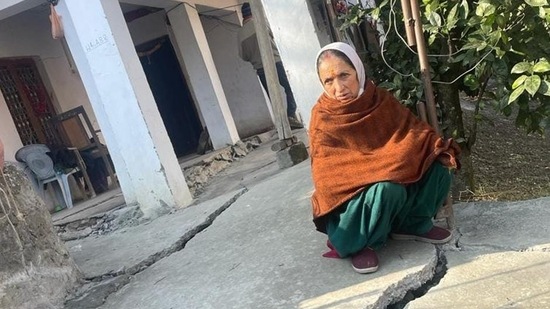Joshimath: Rehabilitation still a tall task for admin
The number of houses that have developed cracks now stands at 863, with 181 of them declared unsafe, according to a bulletin released by the state government on Sunday.
As the land subsidence crisis in Joshimath that led to dangerous cracks on houses in the Himalayan town continues, the rehabilitation of affected people has become a big challenge for the government.

The number of houses that have developed cracks now stands at 863, with 181 of them declared unsafe, according to a bulletin released by the state government on Sunday. So far, 275 families have been shifted to safer locations, including one family on Sunday. In total, 925 people have been shifted to safer locations.
Not all affected residents are willing to settle for compensation and relocate, particularly those running shops and businesses. There are varying views depending on the situation of the people facing displacement.
Also read: Joshimath relief, dismantling work resumed after improvement in weather
“Over the years, we have established our business here. Nobody whose livelihood is dependent on this town wants to leave town. They don’t want a one-time settlement,” said Nain Singh Bhandari, president of Joshimath Vyapar Mandal. “Either the government should work on treating the situation, or make available land nearby for rehabilitation so that even if we relocate from here, we can work here. Only those whose children study, or they themselves work outside, want a one-time settlement.”
Jagdish Negi, who shifted to Him Shikhar hotel near the tehsil office after his house in Singh Dhar ward was declared unsafe, said: “We want a one-time settlement under which adequate compensation should be given to us. At least, it would give us the choice to relocate to the place of our choice.”
Buddh Lal, another affected local, said: “We don’t want a one-time settlement. I know they won’t give us adequate compensation for the land and damage caused to our houses. We just want the government to relocate us to a nearby location so that our livelihood is not affected by the rehabilitation.”
Gopal Lal, a labourer who lived above JP Colony, said: “We should be relocated to a place where the education of my children is not affected and they get better opportunities.”
Anjali Rawat, who has been shifted to Nagar Palika Parishad after major cracks appeared in his house in Singh Dhar ward, said: “We should be paid adequate compensation as per the Badrinath master plan under the one-time settlement. We don’t want the government to relocate us anywhere. Every land is fragile now due to uncontrolled construction by the government in the region. We fear a similar situation would arise in the years to come wherever we will be relocated.”
The Uttarakhand government recently said it will rehabilitate of over 120 families from Joshimath to Pipalkoti, some 36km away in Chamoli district as part of the first phase of its plan to help the affected residents.
Pipalkoti is among four sites identified by the district administration to rehabilitate affected residents in Joshimath, disaster management secretary Ranjit Sinha said. The other sites are nearby villages of Dhak and Gaunk Selang, and a horticultural land in Joshimath away from the affected areas.
“We have identified four sites for rehabilitation. In the first phase, Pipalkoti, located at an altitude of 1,260 metres above sea level, has been found appropriate for rehabilitation in about two hectares of land there,” Sinha said.
“We will not be able to settle all the families there (in Pipalkoti), but around 120 to 125 families can be accommodated. The process of identifying other sites is also going on as we would require rehabilitating the remaining affected people,” he added.
Also read: After hotels, dismantling of residential structures begin in Joshimath
On Saturday, district magistrate Himanshu Khurana conducted an inspection of the proposed land for the rehabilitation of affected people in Dhak village and instructed the rural works department to make available a contour map of the land. After taking suggestions from the affected people, a detailed plan for displacement will be prepared by Central Building Research Institute, he said.
The Joshimath Bachao Sangharsh Samiti has criticised the government’s plan to rehabilitate affected families in Pipalkoti, seeking rehabilitation closer to the religious town to which their livelihood is connected.
“More than 90% of the residents are not in favour of settling in Pipalkoti. We have suggested land near Auli and Koti Farm, which is appropriate for permanent settlement,” convener Atul Sati said.






